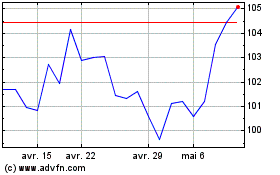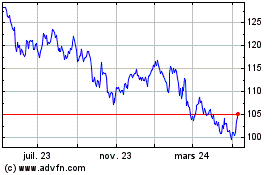Nestle Aims to Boost Sales of Healthier Products by 2030
28 Septembre 2023 - 3:35PM
Dow Jones News
By Giulia Petroni
Swiss packaged-food giant Nestle aims to boost sales of products
with a higher nutritional value by the end of the decade in a step
to improve the health profile of its portfolio.
The maker of KitKat chocolate bars and Nescafe coffee said it
wants to increase sales of these products by between 20 billion
Swiss francs and 25 billion Swiss francs ($21.7 billion-$27.2
billion) by 2030, or by 50% compared with 2022 levels.
The target comprises plant-based food such as vegan burgers,
powdered-milk, some ready meals, as well as baby foods, vitamin and
mineral supplements. Petcare products and infant formula for
children aged 0-to-12 months aren't included.
Food-and-beverage companies have come under pressure in recent
years to boost the health profile of their portfolios and become
less reliant on unhealthy products, generally high in sugar and
saturated fats.
Last year, Nestle started using an international nutrient
profiling system, called HSR, which ranks the nutritional profile
of packaged products on a scale from half a star to five stars
based on the quantity of specific components, including energy,
saturated fat, total sugars, sodium, protein, dietary fiber, and
the content of fruit, vegetables, nuts and legumes. A score of 3.5
stars or above is considered healthy, according to the system.
In its 2022 report, Nestle said that--excluding pet food--37% of
revenue came from food-and-beverage products with a rating of 3.5
stars or more, while 43% came from products rated lower than 3.5
stars. An additional 20% of sales came from specialized nutrition
products, which are not covered by the system and include infant
food and medical nutrition.
Alongside multivitamins and bottled water, Nestle's brands
include a range of breakfast cereals and confectionery like
Milkybar and Smarties, as well as instant-coffee, milkshake drinks
and Haagen-Dazs ice cream.
Investors across the food industry are demanding increased
transparency on the nutritional value of products to get a better
understanding of companies' sustainability efforts, as well to push
for initiatives that help consumers make healthier choices.
Nestle said it will work to improve existing products and grow
its affordable offerings, rolling out initiatives that include the
adoption of more responsible marketing practices, particularly for
children's confectionery and ice cream, and ensuring portions for
products in these categories will be 110 kilocalories or less.
"These changes will be fully rolled out within the next three
years, starting in spring of next year in the U.K. where Nestle
will provide more visually intuitive front-of-pack portion guidance
on confectionery," the company said. "They come on top of Nestle's
decision to voluntarily restrict its marketing to children under
the age of 16, which came into effect at the beginning of July this
year."
The policy, which prohibits direct advertising of confectionery
and ice cream as well as water-based beverages with added sugars to
children under 16 years old, was applied to television and online
platforms, including social media and gaming, with greater than 25%
of their audience under that age.
Write to Giulia Petroni at giulia.petroni@wsj.com
(END) Dow Jones Newswires
September 28, 2023 09:20 ET (13:20 GMT)
Copyright (c) 2023 Dow Jones & Company, Inc.
Nestle (PK) (USOTC:NSRGY)
Graphique Historique de l'Action
De Oct 2024 à Nov 2024

Nestle (PK) (USOTC:NSRGY)
Graphique Historique de l'Action
De Nov 2023 à Nov 2024


